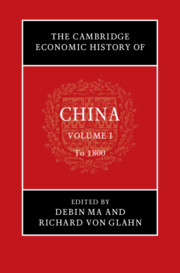Book contents
- The Cambridge Economic History of China
- The Cambridge Economic History of China
- The Cambridge Economic History of China
- Copyright page
- Contents
- Figures
- Maps
- Tables
- Contributors to Volume I
- Acknowledgments
- Note on Citations
- Introduction to Volume I
- Part I Before 1000
- 1 The Economy of Late Pre-imperial China
- 2 Agriculture and Its Environmental Impact
- 3 State and Economy
- 4 Money, Markets, and Merchants
- 5 Economic Philosophy and Political Economy
- 6 Silk Road Trade and Foreign Economic Influences
- Interlude
- Part II 1000 to 1800
- Bibliography of Primary Works Cited
- Index
- References
2 - Agriculture and Its Environmental Impact
from Part I - Before 1000
Published online by Cambridge University Press: 07 February 2022
- The Cambridge Economic History of China
- The Cambridge Economic History of China
- The Cambridge Economic History of China
- Copyright page
- Contents
- Figures
- Maps
- Tables
- Contributors to Volume I
- Acknowledgments
- Note on Citations
- Introduction to Volume I
- Part I Before 1000
- 1 The Economy of Late Pre-imperial China
- 2 Agriculture and Its Environmental Impact
- 3 State and Economy
- 4 Money, Markets, and Merchants
- 5 Economic Philosophy and Political Economy
- 6 Silk Road Trade and Foreign Economic Influences
- Interlude
- Part II 1000 to 1800
- Bibliography of Primary Works Cited
- Index
- References
Summary
China is one of the seven regions in the world where agriculture developed independently, and among the earliest, with cultivation of cereal crops dating back to at least 7000 bce. The unique repertoire of crops first cultivated in China – millet, rice, and soybeans – remained staple foods throughout Chinese history, although millet was mostly displaced by wheat, an import from West Asia, by 1000 ce. The long history of the development of agriculture and the rise of cereal cultivation as the mainstay of human livelihood and economic activity dramatically altered the natural landscape, its landforms, soils, and waters as well as its flora and fauna. Domestication of the environment to serve human needs for food, clothing, shelter, and fuel repeatedly realigned the balance between human populations and natural resources. The strain of burgeoning human populations and their demands on these resources necessitated continual technological innovation to sustain agricultural production and conserve natural resources. By the year 1000 the human impact had utterly transformed the ecology of northern China, especially in the watershed of the Yellow River.
Keywords
- Type
- Chapter
- Information
- The Cambridge Economic History of China , pp. 52 - 91Publisher: Cambridge University PressPrint publication year: 2022

